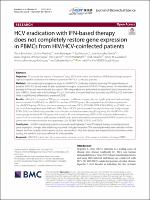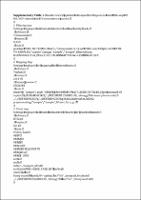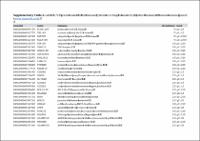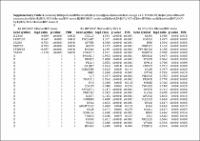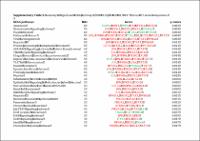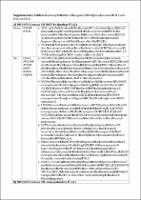| dc.contributor | Vall d'Hebron Barcelona Hospital Campus |
| dc.contributor.author | Brochado, Óscar |
| dc.contributor.author | Martínez, Isidoro |
| dc.contributor.author | Berenguer, Juan |
| dc.contributor.author | Medrano, Luz |
| dc.contributor.author | González‑García, Juan |
| dc.contributor.author | Jiménez‑Sousa, María Ángeles |
| dc.contributor.author | Navarro Mercadé, Jordi |
| dc.date.accessioned | 2021-12-01T13:22:36Z |
| dc.date.available | 2021-12-01T13:22:36Z |
| dc.date.issued | 2021-03-30 |
| dc.identifier.citation | Brochado Ó, Martínez I, Berenguer J, Medrano L, González-García J, Jiménez-Sousa MÁ, et al. HCV eradication with IFN-based therapy does not completely restore gene expression in PBMCs from HIV/HCV-coinfected patients. J Biomed Sci. 2021 Mar 30;28:23. |
| dc.identifier.issn | 1021-7770 |
| dc.identifier.uri | https://hdl.handle.net/11351/6635 |
| dc.description | HIV/HCV coinfection; Immune system; Interferon therapy |
| dc.description.abstract | Objective
To evaluate the impact of hepatitis C virus (HCV) elimination via interferon (IFN)-based therapy on gene expression profiles related to the immune system in HIV/HCV-coinfected patients.
Methods
We conducted a prospective study in 28 HIV/HCV-coinfected patients receiving IFN-based therapy at baseline (HIV/HCV-b) and week 24 after sustained virological response (HIV/HCV-f). Twenty-seven HIV-monoinfected patients (HIV-mono) were included as a control. RNA-seq analysis was performed on peripheral blood mononuclear cells (PBMCs). Genes with a fold-change (FC) ≥ 1.5 (in either direction) and false discovery rate (FDR) ≤ 0.05 were identified as significantly differentially expressed (SDE).
Results
HIV/HCV-b showed six SDE genes compared to HIV-mono group, but no significantly enriched pathways were observed. For HIV/HCV-f vs. HIV/HCV-b, we found 58 SDE genes, 34 upregulated and 24 downregulated in the HIV/HCV-f group. Of these, the most overexpressed were CXCL2, PDCD6IP, ATP5B, IGSF9, RAB26, and CSRNP1, and the most downregulated were IFI44 and IFI44L. These 58 SDE genes revealed two significantly enriched pathways (FDR < 0.05), one linked to Epstein-Barr virus infection and another related to p53 signaling. For HIV/HCV-f vs. HIV-mono group, we found 44 SDE genes that revealed 31 enriched pathways (FDR < 0.05) related to inflammation, cancer/cell cycle alteration, viral and bacterial infection, and comorbidities associated with HIV/HCV-coinfection. Five genes were overrepresented in most pathways (JUN, NFKBIA, PIK3R2, CDC42, and STAT3).
Conclusion
HIV/HCV-coinfected patients who eradicated hepatitis C with IFN-based therapy showed profound gene expression changes after achieving sustained virological response. The altered pathways were related to inflammation and liver-related complications, such as non-alcoholic fatty liver disease and hepatocellular carcinoma, underscoring the need for active surveillance for these patients. |
| dc.language.iso | eng |
| dc.publisher | BMC |
| dc.relation.ispartofseries | Journal of Biomedical Science;28 |
| dc.rights | Attribution 4.0 International |
| dc.rights.uri | http://creativecommons.org/licenses/by/4.0/ |
| dc.source | Scientia |
| dc.subject | Virosis |
| dc.subject | Interferó - Ús terapèutic |
| dc.subject | Expressió gènica |
| dc.subject.mesh | Coinfection |
| dc.subject.mesh | Interferons |
| dc.subject.mesh | /therapeutic use |
| dc.subject.mesh | Gene Expression |
| dc.title | HCV eradication with IFN-based therapy does not completely restore gene expression in PBMCs from HIV/HCV-coinfected patients |
| dc.type | info:eu-repo/semantics/article |
| dc.identifier.doi | 10.1186/s12929-021-00718-6 |
| dc.subject.decs | coinfección |
| dc.subject.decs | interferones |
| dc.subject.decs | /uso terapéutico |
| dc.subject.decs | expresión génica |
| dc.relation.publishversion | https://doi.org/10.1186/s12929-021-00718-6 |
| dc.type.version | info:eu-repo/semantics/publishedVersion |
| dc.audience | Professionals |
| dc.contributor.organismes | Institut Català de la Salut |
| dc.contributor.authoraffiliation | [Brochado Ó, Martínez I, Medrano L, Jiménez-Sousa MÁ] Unidad de Infección Viral E Inmunidad, Centro Nacional de Microbiología, Instituto de Salud Carlos III (Campus Majadahonda), Madrid, Spain. [Berenguer J] Unidad de Enfermedades Infecciosas/VIH, Hospital General Universitario “Gregorio Marañón”, Madrid, Spain. Instituto de Investigación Sanitaria del Gregorio Marañón, Madrid, Spain. [González-García J] Unidad de VIH, Servicio de Medicina Interna, Hospital Universitario “La Paz”, Madrid, Spain. Instituto de Investigacion Sanitaria La Paz (IdiPAZ), Madrid, Spain. [Navarro J] Servei de Malalties Infeccioses, Vall d’Hebron Hospital Universitari, Barcelona, Spain. Vall d’Hebron Institut de Recerca (VHIR), Barcelona, Spain |
| dc.identifier.pmid | 33785040 |
| dc.identifier.wos | 000635147800001 |
| dc.relation.projectid | info:eu-repo/grantAgreement/ES/PE2017-2020/PI20%2F00474 |
| dc.relation.projectid | info:eu-repo/grantAgreement/ES/PE2013-2016/PI17%2F00657 |
| dc.relation.projectid | info:eu-repo/grantAgreement/ES/PE2017-2020/PI20%2F00507 |
| dc.relation.projectid | info:eu-repo/grantAgreement/ES/PE2013-2016/PI17%2F00903 |
| dc.relation.projectid | info:eu-repo/grantAgreement/ES/PE2013-2016/RD16%2F0025%2F0017 |
| dc.relation.projectid | info:eu-repo/grantAgreement/ES/PE2013-2016/RD16%2F0025%2F0018 |
| dc.relation.projectid | info:eu-repo/grantAgreement/ES/PE2013-2016/ INT16%2F00100 |
| dc.rights.accessrights | info:eu-repo/semantics/openAccess |

